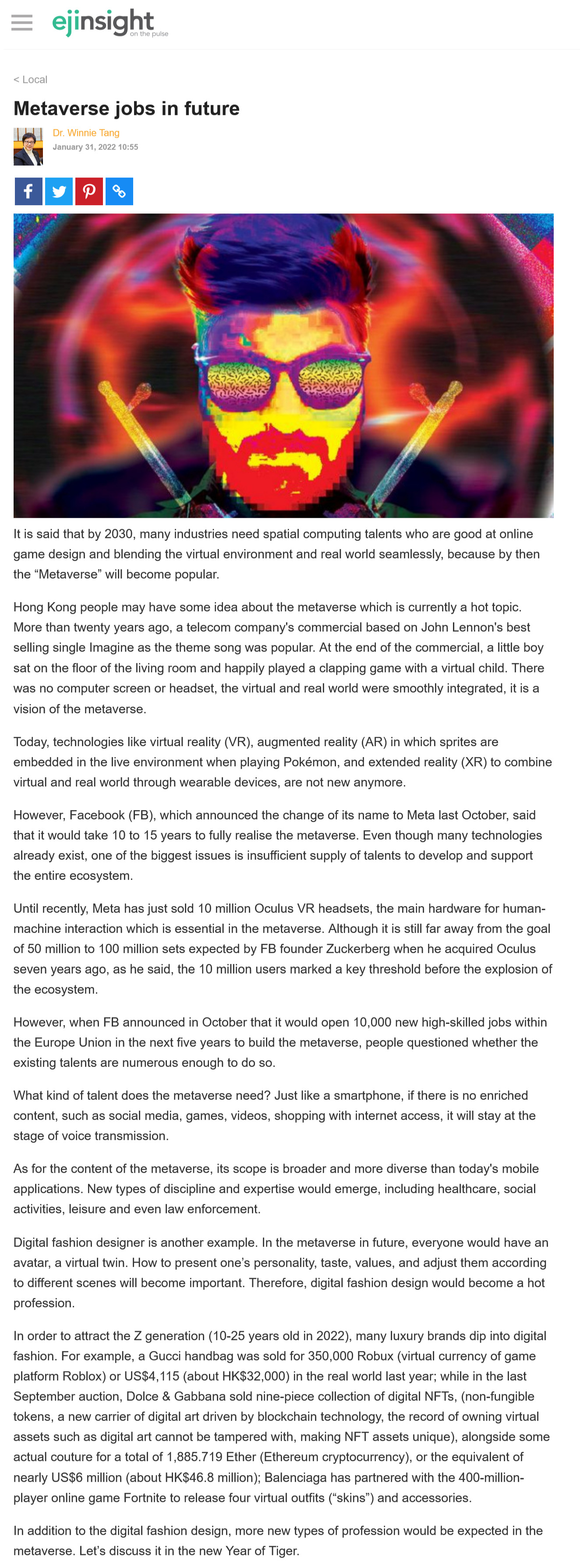網上版請按此

Metaverse jobs in future
It is said that by 2030, many industries need spatial computing talents who are good at online game design and blending the virtual environment and real world seamlessly, because by then the "Metaverse" will become popular.
Hong Kong people may have some idea about the metaverse which is currently a hot topic. More than twenty years ago, a telecom company's commercial based on John Lennon's best selling single Imagine as the theme song was popular. At the end of the commercial, a little boy sat on the floor of the living room and happily played a clapping game with a virtual child. There was no computer screen or headset, the virtual and real world were smoothly integrated, it is a vision of the metaverse.
Today, technologies like virtual reality (VR), augmented reality (AR) in which sprites are embedded in the live environment when playing Pokémon, and extended reality (XR) to combine virtual and real world through wearable devices, are not new anymore.
However, Facebook (FB), which announced the change of its name to Meta last October, said that it would take 10 to 15 years to fully realise the metaverse. Even though many technologies already exist, one of the biggest issues is insufficient supply of talents to develop and support the entire ecosystem.
Until recently, Meta has just sold 10 million Oculus VR headsets, the main hardware for human-machine interaction which is essential in the metaverse. Although it is still far away from the goal of 50 million to 100 million sets expected by FB founder Zuckerberg when he acquired Oculus seven years ago, as he said, the 10 million users marked a key threshold before the explosion of the ecosystem.
However, when FB announced in October that it would open 10,000 new high-skilled jobs within the Europe Union in the next five years to build the metaverse, people questioned whether the existing talents are numerous enough to do so.
What kind of talent does the metaverse need? Just like a smartphone, if there is no enriched content, such as social media, games, videos, shopping with internet access, it will stay at the stage of voice transmission.
As for the content of the metaverse, its scope is broader and more diverse than today's mobile applications. New types of discipline and expertise would emerge, including healthcare, social activities, leisure and even law enforcement.
Digital fashion designer is another example. In the metaverse in future, everyone would have an avatar, a virtual twin. How to present one's personality, taste, values, and adjust them according to different scenes will become important. Therefore, digital fashion design would become a hot profession.
In order to attract the Z generation (10-25 years old in 2022), many luxury brands dip into digital fashion. For example, a Gucci handbag was sold for 350,000 Robux (virtual currency of game platform Roblox) or US$4,115 (about HK$32,000) in the real world last year; while in the last September auction, Dolce & Gabbana sold nine-piece collection of digital NFTs, (non-fungible tokens, a new carrier of digital art driven by blockchain technology, the record of owning virtual assets such as digital art cannot be tampered with, making NFT assets unique), alongside some actual couture for a total of 1,885.719 Ether (Ethereum cryptocurrency), or the equivalent of nearly US$6 million (about HK$46.8 million); Balenciaga has partnered with the 400-million-player online game Fortnite to release four virtual outfits ("skins") and accessories.
In addition to the digital fashion design, more new types of profession would be expected in the metaverse. Let's discuss it in the new Year of Tiger.
Dr. Winnie Tang
Adjunct Professor, Department of Computer Science, Faculty of Engineering; Department of Geography, Faculty of Social Sciences; and Faculty of Architecture, The University of Hong Kong